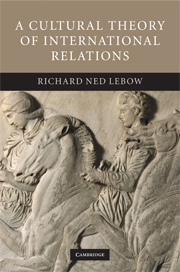Book contents
- Frontmatter
- Contents
- List of figures and tables
- Acknowledgments
- 1 Introduction
- 2 Fear, interest and honor
- 3 The spirit and its expression
- 4 The ancient world
- 5 Medieval Europe
- 6 From Sun King to Revolution
- 7 Imperialism and World War I
- 8 World War II
- 9 Hitler to Bush and beyond
- 10 General findings and conclusions
- Bibliography
- Index
5 - Medieval Europe
Published online by Cambridge University Press: 03 July 2009
- Frontmatter
- Contents
- List of figures and tables
- Acknowledgments
- 1 Introduction
- 2 Fear, interest and honor
- 3 The spirit and its expression
- 4 The ancient world
- 5 Medieval Europe
- 6 From Sun King to Revolution
- 7 Imperialism and World War I
- 8 World War II
- 9 Hitler to Bush and beyond
- 10 General findings and conclusions
- Bibliography
- Index
Summary
Men do not seek each other's company for its own sake, but for honour or profit.
HobbesDrawing on Homer's Iliad, chapter 3 developed an ideal-type description of an honor-based warrior society. Chapter 4 applied it to classical Greece, Macedonia and Rome. I now extend my analysis to Europe, from the early Middle Ages to the French Revolution. I use these cases to refine and extend my argument and to show how the spirit was still important in eras when society was weak and honor all but non-existent.
The Iliad offers a fictionalized account of Bronze Age Greece. My analysis of classical Greece relies on contemporary texts, notably those of Thucydides, Plato and Aristotle, all of whom were influenced by Homer. To a surprising degree, Homeric values and conceptual categories shaped Greek practice, and thinking about their practices. The influence of Homer on the Greeks, and of Homer and the Greeks on the Romans, raises fascinating questions. Chief among these is the extent to which the texts we possess are good guides to the societies they purport to describe. In medieval Europe, as we will see, they present a greatly idealized portrait of Charlemagne and his kingdom. Later texts, notably the poetry of the troubadours, and court literature more generally, depict a fictional world, some of it based on a equally mythical portrait of Rome.
Unlike Bronze Age Greece, we have considerable evidence about the medieval world.
- Type
- Chapter
- Information
- A Cultural Theory of International Relations , pp. 222 - 261Publisher: Cambridge University PressPrint publication year: 2008



